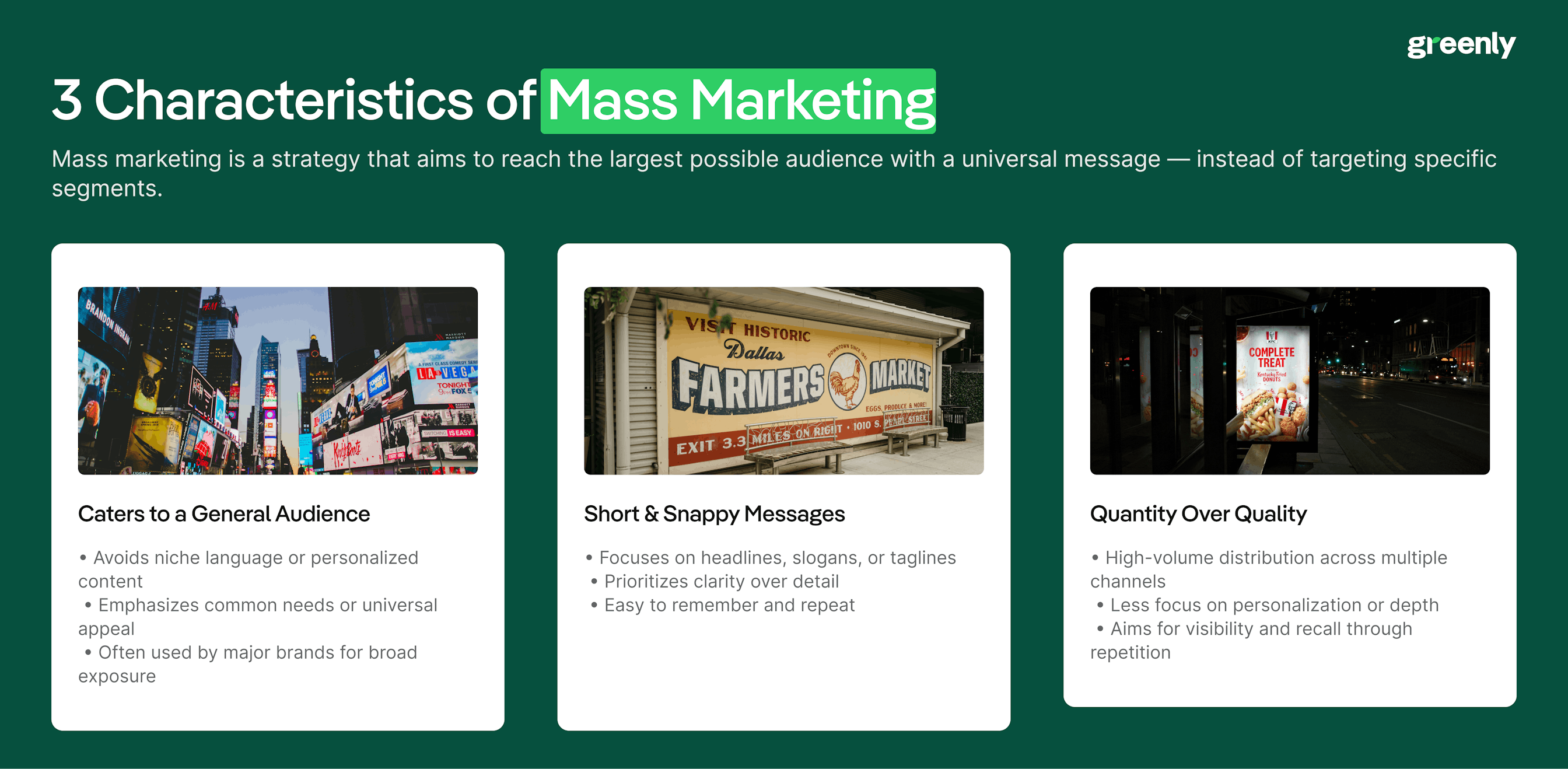
Impacts, Risks, and Opportunities (IRO) for CSRD Reporting
In this article, we’ll break down what IROs are, how to identify and assess them, and what CSRD requires in terms of disclosure.
ESG / CSR
Industries



Consumerism culture has changed our way of life, especially ever since we’ve entered the 21st century – seeing as mass marketing campaigns on the internet, T.V., and social media never give us a break from seeing all of the new merchandise our peers keep persuading us to buy.
Mass marketing refers to the practice and notion of mass advertising and selling as many of the same product as possible for maximum exposure and profit. This can include employing mass marketing efforts to a broad audience, such as during commercials for the Super Bowl, to draw potential customers toward a product.
However, in the midst of shortening attention spans and difficulty concentrating on or desiring a single item or task for long periods of time – it is viable to wonder if mass marketing campaigns can sustain itself in our changing world.
In this article, we’ll explain what mass marketing is, why companies often opt for mass marketing, the downsides of mass marketing, and whether it is the right approach for your organisation and product.
Mass marketing, sometimes called shotgun marketing, is an approach to marketing where the primary goal is to sell as much of the product or service as possible – often in an impersonal fashion, such as through short advertisements instead of utilising personalised email campaigns.
Think of shopping in the grocery store, and coming across a new kind of cereal. Even though you usually purchase another brand, you have seen this new cereal via various distribution channels, such as on T.V. or Tik Tok – it is tempting to try the new cereal.
As a result, online shops or an in-person store may have promotional sale for the cereal – which solidifies your momentary predicament, and you end up buying the “it” cereal of the moment. This is the epitome of mass marketing.
Mass marketing campaigns started back in the 1920s, following the industrial revolution, where traditional mass marketing campaigns were born on the radio as an attempt to build brand awareness.
In the same way that almost everyone in 2025 has a smartphone or access to the internet, by the end of the 1920s – most people had access to the radio. This made the radio the perfect place to test out advertising campaigns and targeted marketing despite the potential demographic differences.
This time period better known as the Production Orientation Era, which took place between the 1800s and the 1920s – and focused on mass production. This marked the shift in consumers preferring quantity over quality in favor of sales volume, affordable prices, and mass marketed products.


Some common characteristics of mass marketing include:
The summary cards below will break down four different types of mass marketing:
Think of the last time you were standing in the checkout line at a store, and came across a low-priced product while waiting to purchase what you initially came to the store for – such as at CVS or T.J. Maxx. These could be daily essentials, or non-essential items, such as a nifty lip balm or new iPhone charger.
Regardless of the type of item being sold, this type of merchandise is the perfect example of mass marketing – as these items could appeal to anyone at the store and entice them to buy it without the need for careful consideration or commitment to buying future products from that brand again.

The most popular examples of mass marketing include advertisements seen on social media, apps, and on the internet or T.V – but mass marketing has continued to evolve alongside the age of digital media.
Mass marketing is most successful when it is done with a product or service that can be advertised and prove useful or enjoyable to anyone and everyone regardless of age. This could include soda drinks, gum, coffee, or something to be used for a smartphone or laptop – all of which the majority of people will use in their everyday lives.
Therefore, it is important to note that niche items will not work well under mass marketing – such as specialised mattresses for a back back, kitchen utensils and gadgets which could speed up cooking time, or new medicine for a rare disease.
Mass marketing works best when it is used for a product or service that are considered necessities and can be used amongst the majority of people.
The flip cards below (move cursor over cards to flip) will reveal some mass marketing examples of popular products often effective under vague promotional messages:
Other less common, but still used methods of mass marketing may include:
In 2025, the most common method used for mass marketing will undoubtedly be on social media – seeing as companies have the best bet at gaining people’s attention with short-form content.

There are several benefits to mass marketing, but the overarching advantage to mass marketing amongst many is that it provides the opportunity for a rapid and sizable increase in profits.
The main reason why companies will choose mass marketing over other forms of marketing is because it allows them to gain exposure to their target audience and increase their sales revenue in a short period of time – which can prove more challenging with traditional marketing methods.
Mass marketing is effective for companies that want to follow a “traditional” business model, seeing as the steps for curating, promoting, and selling a product or service under mass marketing does not require the same personal efforts that other marketing approaches demand.
The vertical timeline below will reveal the formula that the majority of mass marketing aims to follow:
The steps and requirements for mass marketing are usually as follows:
Mass marketing can help companies to get their name out there faster than other types of advertising – providing “fifteen minutes of fame” for the business – and may provide better chances at selling another viral product or service.
The drop down sections below will further reveal why companies, regardless of size or sector, opt for mass marketing campaigns:
Ultimately, many companies will opt to use mass marketing over other forms of advertising seeing as it is easier to produce more advertisements, numerically, than it is to take the time to develop higher quality and creative campaigns – hence the word “mass” in mass marketing.

Although mass marketing may seem like a “get-rich-quick” scheme for your company, there are several downsides to mass marketing – such as lower profit margins, standard products that lack a unique quality, and little to no chances of returning customers.
The flip cards below (move cursor over the card to flip) will reveal how the potential drawbacks of mass marketing:
Mass marketing should be viewed as a momentary boost as opposed to a sustainable method of growing awareness or business surrounding a product or service.
Think of when someone commits to going to the gym or eating vegan every single day during the month of January in order to kick off the new year. While good for your health, working out daily or avoiding meat forever may not be sustainable practices for everyone to follow. The same goes for mass marketing, seeing as while it may be effective in the short-term – it may prove difficult to sustain the consistency of how often those ads are shown.
Other cons to mass marketing include:
The majority of companies will opt for mass marketing as it can allow small businesses to share their product or service to a general audience or large group at the hopes of finding a specific group interested in their company. As a whole, this type of mass advertising is usually less expensive and time consuming as opposed to more personalised marketing campaigns.
The summary cards will break down two different scenarios of an indie musician trying to market their music:
However, one of the biggest problems with mass marketing is that it continues to promote a consumerism based culture – which is contributing to more climate change as people will throw away their fast fashion, old pieces of technology, and more before the product has reached the end of its life-cycle.
It is important to note that given the current climate change crisis, mass marketing could prove dangerous to the future of our planet – seeing as mass marketing encourages rapid sales and consumption.
Ultimately, mass marketing is not conducive for companies who want to build brands with long-term value or a loyal customer base. Therefore, one of the solutions for companies that prefer to not take the bolder route associated with mass marketing may want to opt for its counterpart – niche marketing.
Known as the opposite of mass marketing, niche marketing centers around creating a product with low prices that can appeal to everyone – such as the merchandise found at a wholesale store such as Marshalls, Ross, or T.J. Maxx.
One of the main differences between mass marketing and niche marketing is that niche marketing will target a select audience – often for products and services that have little to no competition. This is the antithesis of mass marketing, which focuses on spreading the word on a popular product or service to anyone mass marketing is able to reach – and to influence as many people to purchase the product as possible.
The battle cards below will break down the differences between mass marketing and niche marketing:
Niche marketing is usually best for companies looking to cultivate greater brand loyalty, seeing as this type of marketing is most successful when catering to a specific demographic or audience.

At the end of the day, choosing the route of mass marketing, niche marketing, or an approach in-between will all depend on your company’s personal and professional goals – such as if you value loyal customers or increased sales revenue.
For example, if your company is in dire need of immediate funds – mass marketing may be a way to collect the financial resources needed, and then provides the opportunity to transition to a more sustainable model for business growth.
Mass marketing may be right for your company if the product or service you’re selling is generic and can be used amongst a wide variety of demographics around the world. It can help expose new people to your business and momentarily boost sales, but long-term profitability or returning customers is not a guarantee with mass marketing.
Therefore, choosing mass marketing is not a good or bad choice – but companies opting for this marketing route must remain aware of the consequences, and how mass marketing might continue to habitually benefit or hinder their company in the long-run.
If reading this article about mass marketing and its longevity has made you interested in reducing your carbon emissions to further fight against climate change – Greenly can help you!
Keeping track of all the necessary business tactics that could impact the longevity of your company’s marketing tactics can be challenging in the midst of climate change, but don’t worry – Greenly is here to help. Click here to schedule a demo to see how Greenly can help you comply with all of the upcoming regulations relevant to your company.
Greenly can help you make an environmental change for the better, starting with a carbon footprint assessment to know how much carbon emissions your company produces.